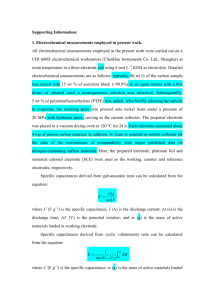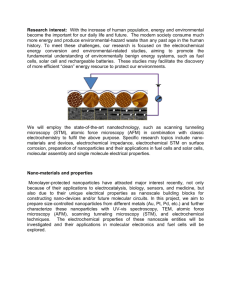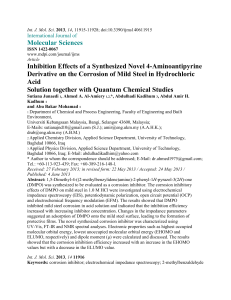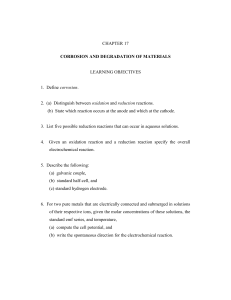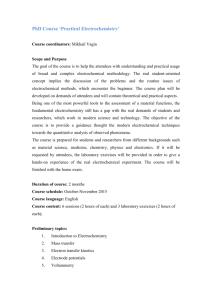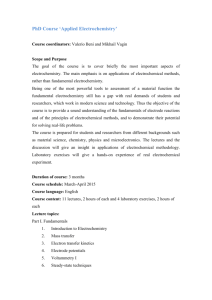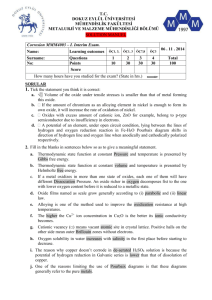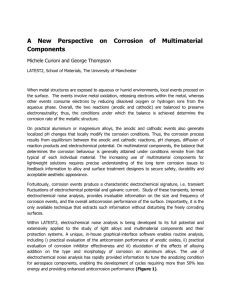Instructor: Dr. Branko N. Popov - Department of Chemical Engineering
advertisement
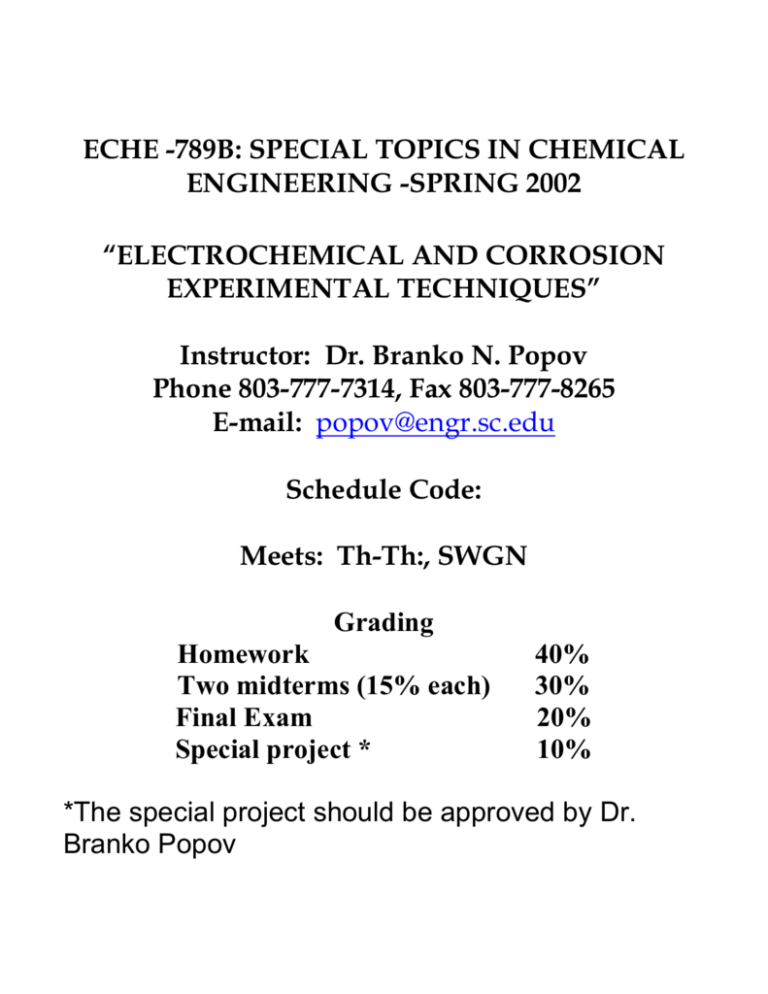
ECHE -789B: SPECIAL TOPICS IN CHEMICAL ENGINEERING -SPRING 2002 “ELECTROCHEMICAL AND CORROSION EXPERIMENTAL TECHNIQUES” Instructor: Dr. Branko N. Popov Phone 803-777-7314, Fax 803-777-8265 E-mail: popov@engr.sc.edu Schedule Code: Meets: Th-Th:, SWGN Grading Homework Two midterms (15% each) Final Exam Special project * 40% 30% 20% 10% *The special project should be approved by Dr. Branko Popov Course Objectives: The objective of this course is to introduce the student to: The underlying science of electrochemical and corrosion techniques. The special topics are: Electro-chemical thermodynamics and electrode potentials. Kinetics of electrode reactions. Mass transfer by migration and diffusion Voltammetry of reversible and irreversible processes Controlled potential techniques Controlled current techniques Techniques based on concept of impendence Modern electrochemical techniques applied in corrosion rate determinations Industrial electrolysis processes Experiments: Each student will be required to complete 6 of the following experiments: Electrochemical Dc techniques: (1) cyclic voltammetry, (2) voltage step method, (3) cyclic potentiostatic method, (4) galvanostatic method Alternating current methods: (1) faradic impendence method, (2)faradic distortion method (the use of second harmonics), (3) electrochemical impedance spectroscopy. Electrochemical DC techniques for corrosion rate determinations: (1) potentiodynamic technique, (2) polarization resistance technique, (3) cyclic polarization, (4) Tafel. Determination of cycle life of batteries and capacitors Special Projects: (1) statistical analysis of corrosion data, (2) corrosion protection design for reinforcing steel in concrete, (3) design of cathodic protection system for buried structures, (4) design of sacrificial anode protection system for structures, (5) modeling of inhibition mechanism of organic inhibitors, (6) modeling of degree of delamination of organic coatings on steel-simulation of circuit analog models, (7) modeling of hydrogen diffusivity in metals, (8) modeling of electrodeposition of alloys and composites. Textbooks and Notes 1. A. J. Bard and L. R. Faulkner, “Electrochemical Methods-Fundamentals and Applications,” John Wiley & Sons, 1980. 2. Denny A. Jones, “Principles and Prevention of Corrosion,” Macmillian Pub. Co., New York, 1995. 3. B. N. Popov and R. E. White, “Electrochemical and Corrosion Experimental Techniques,” Notes USC, 1995. ECHE 789B SCHEDULE FOR EXPERIMENTAL WORK EXPERIMENT 1. POTENTIOMETRY 2. CONDUCTOMETRY 3. TAFEL TECHNIQUES 4. ELECTROCHEMICAL CORROSION TECH. Linear Polarization Potentiodynamic Method Galvanostatic Method Potentiostatic Method Cyclic Polarization 5. HYDROGEN PERMEATION TECH. 6. ELECTROCH.. IMPEDANCE SPEC. (EIS) Basic/Equivalent Cicuits/Mathemathical Model Evaluation of Organic Coatings 7. CYCLIC VOLTAMMETRY 8. CHRONOPOTENTIOMTTERY 9. SPECIAL PROJECTS DATE TOPICS 1. Equilibrium Electrode Potentials (1.1) Thermodynamic expression for EMF and EP, (1.2) International Convention, (1.3) Classification of Electrodes, (1.4) Electrodes of the first kind, (1.5) Electrodes of the second kind, (1.6) Redox electrodes, (1.7) Standard electrode potentials, (1.9) Types of electrochemical systems, Concentration cells. (1.0) Potentiomtery 2. Conductivity (2.1) Electrochemical cell equivalent circuit, (2.2) Measurement of solution resistance, (2.3) Molar conductivity, (2.4) Ionic Conductivity, (2.5) Transference Numbers, (2.6) Ionic Motilities, (2.7) Theoretical treatment of conductivity, (2.8) Conductance Applications Conductometry 3. Kinetics of Electrode Processes (3.1) Basic Concepts, (3.2) The EMF of polarization, (3.3) Electrode Polarization, (3.4) Classification of Polarization Phenomena, (3.5) Faraday’s Law, (3.6) Concentration Polarization, (3.7) The Theory of Diffusion overpotential covering convective diffusion, (3.8) The polarization method, (3.9) Method of investigation, (3.1a) Preparations of solutions and electrodes for electrochemical studies Tafel Techniques 4. The process of hydrogen evolution and Hydrogen Permeation (4.1) General desorption of the process, (4.2) Dependence of hydrogen overpotential on current density and electrode material, (4.3) Effect of solution nature and composition on hydrogen overpotential, (4.4) The effect of temperature and some other factors, (4.5) Possible steps and paths for the cathodic hydrogen evolution reaction, (4.6) Electrochemical overpotential in the hydrogen evolution reaction, (4.7) The chemical reaction overpotential in hydrogen evolution, (4.8) The nature of Hydrogen overpotential on different metals. Hydrogen Permeation into metals 5. Electrochemical corrosion of metals (5.1) General description of corrosion process, (5.2) Classification of corrosion process, (5.3) Conditions of occurrence of a corrosion process, (5.4) The kinetics theory of corrosion and its application to pure metals, (5.5) Corrosion of technical metals, (5.6) Methods of corrosion protection. Linear Polarization Potentiodynamic Method Galvanostatic Method Potentiostatic Method Cyclic Polarization 6. Voltammetry of Reversible Systems (6.1) Solution of Diffusion equation, (6.2) Current-potential curves, (6.3) Diffusion layer thickness. Cyclic Voltammetry 7. Electrochemical Impedance Spectroscopy (7.1) Basics of electrochemical impedance, (7.2) Equivalent circuits, (7.3) Bode plot, (7.4) Nyquist plot, (7.5) Randles plot, (7.6) Admittance plot Techniques based on concept of impedance 8. Chronopotentiometry (8.1) Initial and boundary conditions, (8.2) Variation of the concentrations, (8.3) Potential-time curves, (8.4) Sand Equation, (8.5) Potential-time for totally irreversible process, (8.6) Two consecutive electrochemical reactions involving different substances, (8.7) Stepwise Electrode Processes-The Boundary value problem, (8.8) cathodic process followed by anodic oxidation, (8.9) Transition time for the reoxidation process. Galvanostatic Technique/Chronopotentiometry
